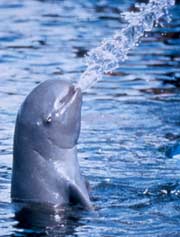Dolphin's survival hangs in balance |
 Irrawaddy Dolphin Photo - Kalimantan (Borneo) |
Thailand's global appeal may face opposition from hungry Japanese
Thailand's bid to protect the Irrawaddy dolphin will be the first of more than 50 proposals to be debated after the Convention on International Trade in Endangered Species of Wild Fauna and Flora (Cites) summit opens today.
Thailand's representatives appear set to win the support of six of the 13 participating countries, but Japan has indicated its opposition.
The dolphin is currently listed on Cites’ Appendix II, a less serious category meaning it can be traded.
But worried that the dolphin faces extinction, Thailand has asked Cites member countries to move it to Appendix I, which bans its trade and cross-border movement except for research purposes.
Advocates say the species is threatened by Asia's growing marine-park industry because it is easily trained for shows.
"Burma, Singapore, Cambodia, Malaysia, Australia and Bangladesh are supporting us now," said Maitree Duangsawasdi, director-general of the Department of Coastal and Marine Resources.
"We've also received good signs that Indonesia, the United States and the 25 European Union nations will vote support us, but we have no official confirmation," he said.
Other countries where the dolphin is found are India, Laos, Papua New Guinea, the Philippines, East Timor and Vietnam.
Just 2,000 Irrawaddy dolphins survive in the world, half of them in Australian waters.
Only 100 are left in Thailand, 34 in Indonesia, 59 in Burma and between 69 and 100 along the Mekong River.
The species lives in both fresh and salt water.
Their fate will be debated on Monday, when negotiations begin in earnest at the 12-day Cites meeting.
Japan is expected to be the chief opponent of stronger protection for the dolphin.
 Dolphin spits water Photo Stephen Leatherwood |
"They love eating whale and dolphin meat," said Brian D. Smith of the Wildlife Conservation Society, adding that Tokyo has long pressed Cites to allow trade in Minke whales.
"We will try every way and do our best to better protect the Irrawaddy dolphin under Appendix I," Maitree said, "even if we have to make a deal regarding the Minke."
Thailand is also tabling four proposals on flora.
It wants to ease protection on the Yoak (Euphorbia lactel) and Poaysian (Euphorbia milii) orchid hybrids so they can be traded freely, arguing that they are no longer in critical danger.
Nor is the Faa Mui (Vanda coerulea), or blue vandal, any longer threatened, Thai representatives say.
Prime Minister Thaksin Shinawatra will preside at today’s opening ceremony starting at 3.30pm.
Some activists expect him to address significant policies, possibly including further obstacles to the ivory and live-elephant trade or the establishment of an international “wildlife police” force.
Sirinart Sirisunthorn, Kamol Sukin
http://nationmultimedia.com/page.news.php3?clid=4&id=121830&usrsess=1
2 October, 2004
© Nation Multimedia Group